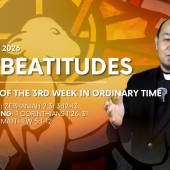Beatific Attitudes

September 13, Wednesday of the 23rd Week in Ordinary Time
Memorial of Saint John Chrysostom, Bishop and Doctor of the Church
Daily Readings: Colossians 3:1–11; Luke 6:20–26
“Blessed are you who are poor, for yours is the kingdom of God.(Luke 6:20)
Matthew’s version of the Beatitudes presents eight groups of blessedness. But the Lucan version presents four contrasting groups of blessedness and four groups of woeness.
They are the poor against the rich, the powerful against the powerless, the hungry against those who are filled, the weeping against the laughing, and the rejected against the accepted!
Although the Beatitudes state that ‘blessed are those who are poor’ it does not say that poverty is blessedness. Similarly, Blessed are those who are hungry’ but does not say that hunger is blessedness. Blessed are those who are weeping, but never say that sorrow is blessedness. Blessed are those who are rejected, but never say rejection is blessedness. Similarly, "woe to the rich," but it never says "richness," "laugh," or "honor," is "woeness!"
Beatitudes are 'beatific - attitudes' or proposals of a program for a ‘beatific life’ or holy-blessed life. The basis of 'blessedness' or 'woeness' in one's life is not determined by positive experiences like richness, laughter, power, and acceptance or negative experiences like poverty, hunger, tears rejection, etc. It is a personal choice.
While the four “blessednesses” are beatific attitudes, the four woenesses do not curse but are warnings about our preoccupation with material realities that may prompt us to forsake the needs of the soul by making ourselves feel self-sufficient and secure even without the need for God. Amen.
Radio Veritas Asia (RVA), a media platform of the Catholic Church, aims to share Christ. RVA started in 1969 as a continental Catholic radio station to serve Asian countries in their respective local language, thus earning the tag “the Voice of Asian Christianity.” Responding to the emerging context, RVA embraced media platforms to connect with the global Asian audience via its 21 language websites and various social media platforms.














